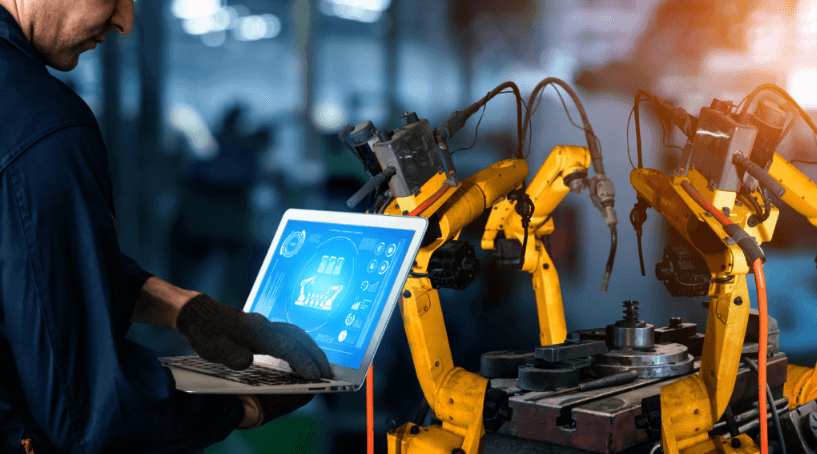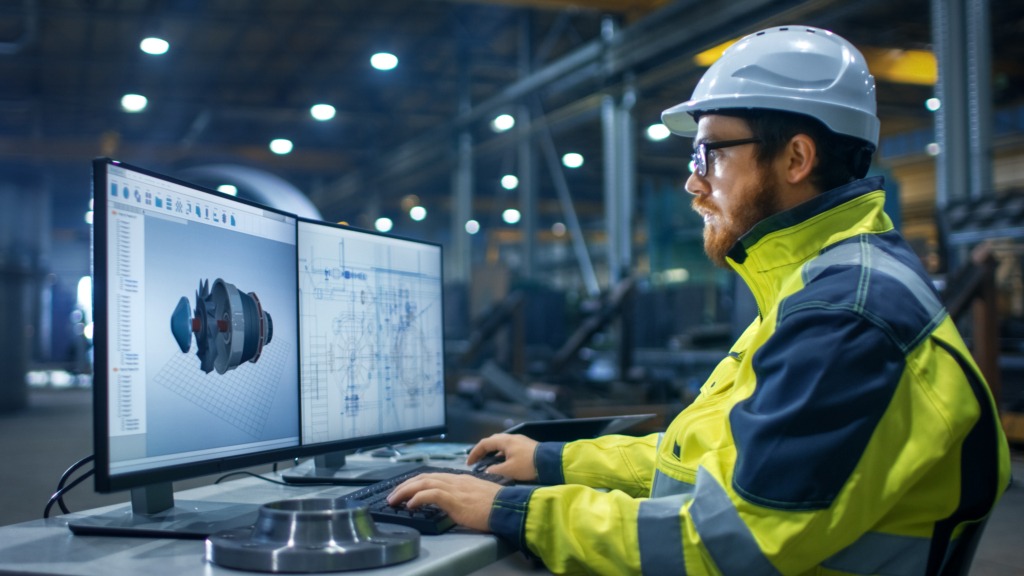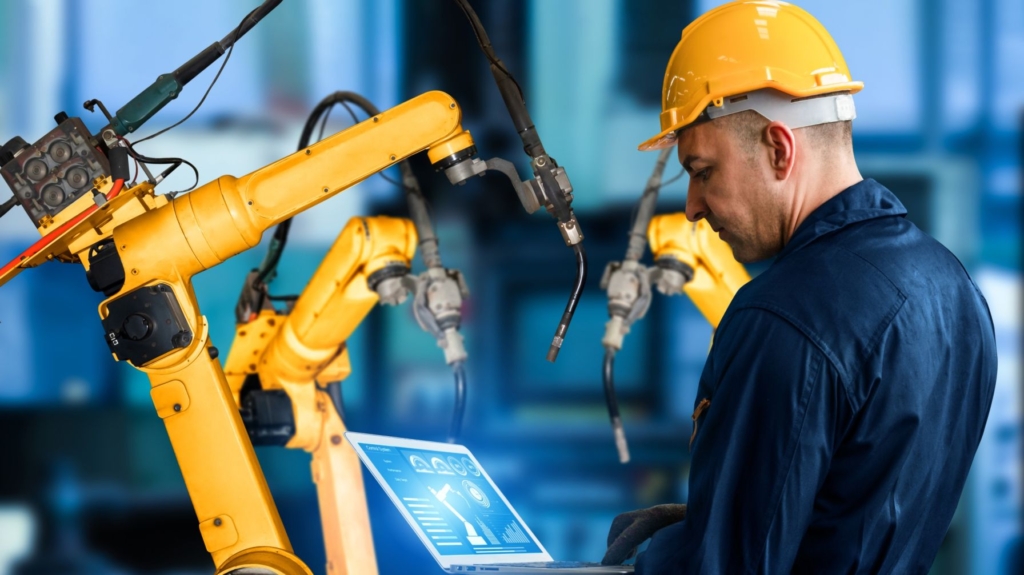Navigating Travel Industry Risks with Intelligent Communications
We’re going to explore some real-life unforeseen circumstances that the travel industry has had to navigate and how intelligent communications solut...
If you paid attention in history class, you will have heard of the industrial revolution. For those who fell asleep at the back of the class – it was the period of significant, scientific and technological development that began in the UK in the late 1700s and enabled more efficient manufacturing processes. Many people think of the industrial revolution as a stand-alone event that started the technological progression which has led to where we are today. Although it was a starting point, this industrial revolution is the first of four. Industry 4.0, also known as the fourth industrial revolution is the current period of technological innovation and progression we are experiencing. Although it may be a new concept to some, businesses around the world are already embracing the fourth revolution, with 72% of respondents to the 2022 Industry 4.0 Adoption Survey reporting that they are in the process of implementing their Industry 4.0 strategy within their business.
From improved processes, and opportunities to create new businesses to facilitating more sustainable practices, Industry 4.0 is set to make a huge impact across all sectors and industries. So, we’re going under the bonnet of Industry 4.0 to discover how it works, its importance and what it means for your business.

To understand how Industry 4.0 works, it’s key to understand the journey to the fourth industrial revolution. It’s taken us over 200 years to get here, so it’s only right that we honour the technologies and innovations that paved the way.
The original industrial revolution occurred between 1760 and 1830 and Britain had the monopoly on the technology, innovations and skills that arrived during this period. It was steam that powered this revolution with the invention of the steam engine accelerating manufacturing processes and enabling new production methods that boosted the economy. This era saw industry overtake agriculture as the backbone of the economy.
The next industrial revolution is usually reported to have taken place between the years of 1870 and 1914 – although there are some events that contributed to this revolution that took place in the 1850s. Huge technological progression led to the emergence of new energies – electricity, gas and oil. We started to utilise many, previously unused, natural materials, including lighter metals, new alloys and rare earths alongside new synthetic products, like plastic. The synergy created with our, newly-discovered energy sources and materials, alongside developments in machinery and tools gave rise to automation, including the introduction of the assembly line, which transformed manufacturing forever.
This revolution took place in the second half of the 20th century and continued well into the 21st. This revolution brought about the rise in electronics, telecommunications and, most significantly of all, computers. It also saw the emergence of a, previously untapped, energy source – nuclear. The rise of the internet and computing has resulted in rapid technological advances across communications, research and development and manufacturing. The third industrial revolution saw the birth and rapid growth of social media and e-commerce, which enabled new business models and the progression of industries including retail, marketing and advertising.
Industry 4.0 is being regarded as the fourth industrial revolution that is supporting the emergence of smart manufacturing through integrating new digital technologies, such as IoT, AI, cloud computing, analytics and machine learning into existing operations. The fourth revolution is rooted in the rise of digital technology, and this is what is going to power technological progression going forward. At this point, we can see that this Industry 4.0 will see increasing dependence on artificial intelligence and machine learning, virtual reality and businesses will be looking to invest in their digital transformation journeys to support the adoption of new, emerging technologies.
The revolutions that preceded Industry 4.0, all relied heavily on fossil fuels and processes which has placed significant pressure on the earth’s resources. Climate change is at the forefront of current affairs and the public is becoming more eco-conscious, so it’s important that businesses are implementing more sustainable ways of working to attract and retain customers. The technology involved in Industry 4.0 aims to create more sustainable operations and practices through placing less reliance on natural resources and depending on digital technologies that are more energy efficient.
Businesses are already adopting technologies and processes enabled by Industry 4.0 and are utilising digital solutions to transform their business to make operations more efficient. Let’s take a look at a couple of examples:
Car manufacturer, SEAT, has been classed as an Industry 4.0 international benchmark. They are ahead of the game when it comes to digital transformation, having started their journey in 2018. Since then, the company has implemented AI, virtual reality, robotics and big data solutions within their factory. Implementing digital solutions within their manufacturing operations has enabled the company to work more efficiently and has increased agility and flexibility.
One of the company’s latest technological developments is the launch of a pilot programme to receive components by drone. This process has accelerated production, as workers can receive components in just 15 minutes, compared with the hour and a half it took for components to be delivered by trucks.
Bosch Automotive Diesel System Factory in Wuxi, China, has been combining IoT (internet of things) and big data to drive their digital transformation. For more efficient management of its overall production process, the company has connected all of its machinery through embedding sensors which are used to collect data about the machines’ conditions and cycle time. Once this data is collected, advanced data analytics tools process it, in real time, to alert workers of any issues that could slow down operations. This proactive approach enables Bosch to predict equipment failures, enabling the factory to schedule maintenance operations before failures occur and slow down production.

We’re currently using the earth’s resources quicker than they can be replenished, which is placing a lot of pressure on the environment. From the reliance on fossil fuels, to producing excessive waste and destroying ecosystems, human activity is having a devastating impact on the climate. As such, consumers (and society as a whole) are becoming more aware of the negative impact we are having on the planet and are making steps that are more environmentally friendly.
A survey conducted by Deloitte has shown that consumers are embracing ‘circularity’ – where products or resources are renewed, repaired, or regenerated rather than thrown away and replaced. 53% of consumers claimed to have repaired an item rather than replaced it, 40% bought second-hand or refurbished goods and 38% paid extra for a more durable or longer-lasting product. It therefore makes sense that businesses are adopting a ‘circular economy’ (CE) business model, to help transform their operations to become more sustainable.
Industry 4.0 supports CE through enabling businesses to achieve more sustainable operations through eco-efficient solutions and production processes. Digital solutions, such as data collection, Internet of Things and cloud computing enable businesses to have greater visibility over their production and supply chain to implement changes that reduce waste and make production lines more efficient. Businesses who are looking to meet the needs of the increasingly environmentally-conscious consumer, will need to start their digital transformation journey in order to have the capabilities to embrace Industry 4.0 and implement a CE model to become more sustainable.

With automation reducing the number of manual tasks within a process, the natural fear is machines will be decreasing the need for employees within a workplace. Whilst automation will mean that fewer employees will be required to complete repetitive, menial tasks, the adoption of industry 4.0 technologies will create new jobs to develop, optimise and manage cyber-physical systems. Skilled labour will still be required to install and maintain hardware, operate cloud-based platforms and action decisions and tasks created by data analysis.
Let’s look at the job market today. Many career pathways and job roles exist as a result of technological progression, the rise of social media and other digital innovations from last 10 years. New innovations and advancements in existing technology open opportunities for new markets, which result in the creation of new businesses and new job opportunities. This will continue to be the case with Industry 4.0. Solutions, such as cloud environments, platforms and applications will require human talent to create, develop and manage them. New solutions will need marketing professionals to promote them. Sustainability Officers and decision-makers will need to strategise how to implement this new technology to achieve sustainable operations. Like the revolutions that came before, as Industry 4.0 refines and streamlines processes and the human resource they require to make them more efficient, it will also open doors to new opportunities for the future workforce.
However, it’s important to consider the skills that the future workforce will need to possess to achieve roles within businesses that have embraced Industry 4.0. The required skills of employees 40 years ago were vastly different from those required today. Basic digital and computing skills are an essential requirement to most roles regardless of industry or sector. Therefore, the education system has had to adapt for future generations of employees to learn these skills.
Moving forward, not only will the digital skills taught within the education system need to evolve to meet the requirements of an increasingly digital world, but existing employees will also need adapt and develop their skills too. The World Economic Forum has estimated that 50% of all employees will need reskilling and/or upskilling by 2025, in order to adopt new and emerging technologies brought about by Industry 4.0.
Although Industry 4.0 will, undoubtedly, provide a wealth of benefits for businesses, there are quite a few challenges that will need to overcome in order to adopt new digital technologies, successfully.
We’ve already covered the potential skill gap that will require both change within the education system and the upskilling of the existing workforce. We’ve also established that, despite automation, human labour will still be required to operate and manage systems within businesses adopting Industry 4.0 technologies. Businesses may need to invest in training for staff in order to help them adapt to new solutions.
The rise in smart technology, such as artificial intelligence, has raised concerns over data security and privacy. Implementation of artificial intelligence within a process, would require a business to share data with a third-party developer to train the AI algorithm. Naturally, businesses are reluctant to share their data due to privacy and security risks, so finding a way to share business data, whilst keeping it secure, would be a priority when adopting intelligent technologies.
Following along a similar theme, as technology is evolving, so are the cyber attacks that threaten them. With physical solutions and environments becoming integrated with digital technologies, the attack surface is expanded, opening up new potential vulnerabilities for a cyber-criminal to exploit. Businesses will need to make cybersecurity a top priority within their digital transformation strategies to ensure that Industry 4.0 technology is supported by strong security solutions and protocols.
Industry 4.0 will present an increasing reliance on IoT-enabled devices in order to create smart processes. Therefore, business will need strong connectivity solutions to provide the bandwidth necessary to support a large number of IoT devices. Furthermore, effective device management will need to be implemented to provide complete visibility of business devices, their status, faults, data and more.
Now, we’ve gone through the doom and gloom surrounding potential challenges businesses could face when embracing Industry 4.0, let’s focus on the fantastic benefits this new technological era will provide for businesses.
From streamlined production lines to efficient supply chains and optimised operations, Industry 4.0 has the power to improve all areas of a business from manufacturing to administration. Predictable maintenance, proactive management of devices and smart technology powering every element within a process means less downtime, reduced faults, effective monitoring and smart decision-making.
With business devices connected through IoT protocols, both machines and human employees will have access to the data they need, whenever it’s required. Where necessary, machines will be able to share and access information automatically, without human input, allowing the automation of repetitive tasks that will free up employee time to work on tasks that provide more value.
Digital technology will enable access to large amounts of in-depth data that can be used to fuel better decisions within a business. From enhancing customer experiences to creating more targeted marketing campaigns and prioritising your supply chain to provide products and services that your customers need, having access to detailed data allows improvement across a business’s entire operations.
Industry 4.0 holds the power to minimise waste within manufacturing through smart processes and intelligent technology enabling production to become more efficient. Increased reliance on digital technologies will help to reduce wasteful energy consumption, by automating processes and creating smart workplaces that monitor and reduce energy usage, where possible. Digital technologies encourage paperless workspaces and enable work to be completed from any location, therefore reducing the need for employees to travel into a physical location. This will result in reduced carbon emissions, due to staff not having to commute as often and also reduce the pollution, energy usage and waste associated with running an office.
The emergence of new technologies means opportunities arise for new businesses and new markets. Entrepreneurs can explore gaps in the market for new products and services. Established businesses can take advantage of new markets in which they can expand their product offering or create services to facilitate the adoption of Industry 4.0 technology or even create, or facilitate the creation of new innovations.
Industry 4.0 and sustainability both play a huge role in the vision of our business. Not only are we helping businesses to embrace Industry 4.0 technology, we’re embracing it ourselves within Elite Group. So, you can rely on us for the latest solutions coupled with practical knowledge and expert support.
If you’re looking to embrace Industry 4.0, your business needs to invest in digital transformation to have the technology necessary to support advances and innovations emerging during the fourth industrial revolution. Whether you’re looking to continue your digital transformation journey or you’re taking your first steps and are unsure where to start – our experts are here to help. Contact us here today or call 0344 875 8880.